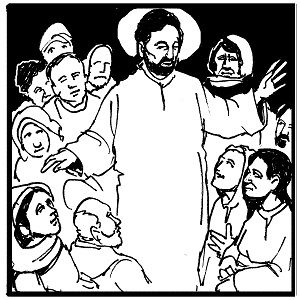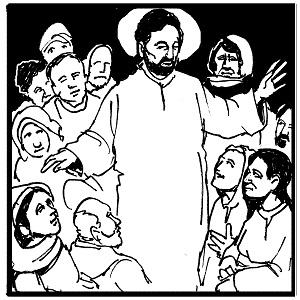

“Look at my hands and my feet, that it is I myself” (Luke 24:40).
The church’s witness to the resurrection progresses from Mark’s earliest account, which ends with the empty tomb and the terrified women who tell no one, to later appearance stories and descriptions of the risen Jesus. And these accounts move from vaguer descriptions or gradual recognition to more explicit affirmations that the risen one is truly the crucified Jesus.
Today’s Gospel from Luke follows the encounter of the two disciples on their way to Emmaus. At first, they do not recognize Jesus, but when this stranger explains the Scriptures and breaks bread with them, their eyes are opened to reveal Jesus, who then disappears. They race back to Jerusalem to tell the group what has occurred.
Jesus again appears suddenly among the gathered disciples, who are still confused and in doubt despite the report of their returning companions. They are first terrified by what they think is a ghost. Jesus shows them his hands and his feet. Here is the church’s Easter proclamation. The risen one is no stranger or mysterious glorified being. It is Jesus of Nazareth.
The Risen Christ is the crucified Jesus. Keeping these two realities together — crucified and risen -- affirms the deeper claim that by his suffering and the death Jesus fulfilled the Law and the Prophets. Easter faith is not just that he is alive again, but that by his death on the cross Jesus has won forgiveness for sin and freedom from death for all those who repent and believe in him.
The fact that the glorified risen body of Jesus retains the wounds of his crucifixion, so startling and counter-intuitive, is essential in the tradition. The Gospels insist that in glorious victory, Jesus bore the terrible signs of death and apparent defeat.
Jesus points to his wounds to convince his disciples, and us, that it is really him. What love this shows, to lay down his life for us to share forgiveness and eternal life? What more convincing sign do we have in our moments of despair? The hands that reach out to rescue us are the same hands that endured crucifixion.
Jesus also validates the wounds we incur from trying to love and serve others. We, too, will be recognized in glory not with halos and harps, but by our personal sufferings during this life. What we endure here for the sake of love is how God will recognize us as disciples of Jesus. What a strange glory is ours! Yet isn't this the joy of the Gospel?
Advertisement




